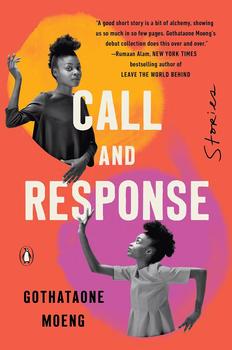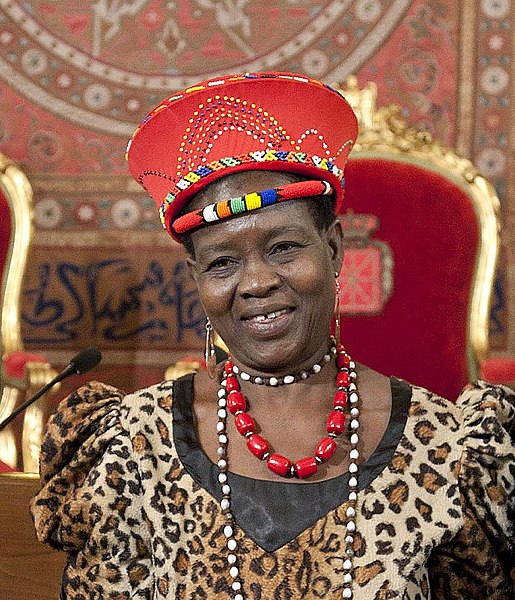Summary | Excerpt | Reviews | Beyond the Book | Read-Alikes | Genres & Themes | Author Bio

Stories
by Gothataone MoengThis article relates to Call and Response
 In the short story "Dark Matter" from Gothataone Moeng's collection Call and Response, which takes place in Botswana, childhood friends Tumo and Nametso love swimming in the river and they love school. Daughters of teachers, they are inseparable until Tumo's mother is transferred. The girls meet up again at university in Gaborone. In her second year there, Nametso really needs a friend when she discovers she is pregnant.
In the short story "Dark Matter" from Gothataone Moeng's collection Call and Response, which takes place in Botswana, childhood friends Tumo and Nametso love swimming in the river and they love school. Daughters of teachers, they are inseparable until Tumo's mother is transferred. The girls meet up again at university in Gaborone. In her second year there, Nametso really needs a friend when she discovers she is pregnant.
Much of sub-Saharan Africa struggles with educating girls partly for reasons related to pregnancy. In "Dark Matter," Nametso becomes pregnant at the university level, has an abortion, and continues her education. Her (albeit fictional) experience is aspirational. While Botswana's economic development and investment in education are higher than that of many other sub-Saharan African countries, it still experiences some of the social problems that make gender inequality in the region's educational systems an issue. Nametso's pregnancy happens at university, but policies and social attitudes can make it difficult or impossible for pregnant adolescents to stay in school long enough to reach higher education — and after giving birth, they often never return. High marriage rates for teenage girls can contribute to the problem. For example, in Malawi about half of all girls are married by the age of 18, and 9% married before the age of 15. Only 6% of girls graduate from high school.
Another issue is that many girls in sub-Saharan Africa don't want to go to school when they have their periods due to shame, misinformation about menstrual management, or a lack of access to menstrual supplies or basic sanitation — what educators refer to as "period poverty." Information from UNESCO suggests that one in 10 sub-Saharan African girls misses instructional days because of period poverty.
However, sub-Saharan African countries have been proactive in trying to combat the desperate situation of girls lacking education access. In the space of this article, it isn't possible to cover all the actions being taken in all 48 countries of the region, but as an example, the government of Botswana has provided public and private school girls with free period products since 2017. Multiple other countries, including Uganda, São Tomé e Príncipe, Mozambique, Zimbabwe and Sierra Leone, have recently changed laws and policies to make it easier for pregnant students and mothers to attend school.
Stepping Stones International in Botswana runs an after-school outreach program for orphans and vulnerable adolescents, including those who have dealt with inconsistent education. SSI has also offered STEM programs that build girls' critical thinking and academic skills through design processes and engineering challenges, helping to narrow the gender gap in the sciences. CHATS (Creating Healthy Approaches to Success) is an after-school program in Malawi that teaches business and life skills to girls, and provides education about reproductive and sexual health. Ninety percent of participants complete secondary school, 91% delay marriage and pregnancies until after they turn 18, and 90% feel they are role models for their villages.
For some dedicated community leaders, educational disparities and gender inequality feel personal and have led them to direct action. Theresa Kachindamoto, a senior tribal chief from the Dedza District in the central region of Malawi, has annulled more than 1,000 child marriages and subsequently been given the nickname "Terminator." As she explains, equity in education is a struggle: "Changing attitudes and behaviours takes time, particularly, with male chiefs and parents who benefit from arranged, child and forced marriages. As we speak, parents are withdrawing their girls from schools."
However, changes are being reflected in the data. In 2000, 44% of girls in sub-Saharan Africa completed education at a primary level. The numbers from two decades later show the completion rate for girls rising to 66%, putting them ahead of boys (who finish primary education at a rate of 61%). Crucially, girls still lag behind boys in secondary education, but the gap is closing, with now only a 2% difference at the lower secondary level and 3% at the upper level. Girls continue to depend on intervention programs more than boys because of the more limited opportunities available to them, particularly in rural areas.
The population of sub-Saharan Africa is projected to be more than twice that of Europe, including Russia, by the year 2045. The future of the world depends upon the education of girls and women in this region.
Tribal chief Theresa Kachindamoto, known for annulling child marriages and advocating for girls' education, 2018.
Photo by Nafarroako Gobernua (CC BY-SA 3.0)
Filed under Society and Politics
![]() This "beyond the book article" relates to Call and Response. It originally ran in February 2023 and has been updated for the
February 2024 paperback edition.
Go to magazine.
This "beyond the book article" relates to Call and Response. It originally ran in February 2023 and has been updated for the
February 2024 paperback edition.
Go to magazine.
A library, to modify the famous metaphor of Socrates, should be the delivery room for the birth of ideas--a place ...
Click Here to find out who said this, as well as discovering other famous literary quotes!
Your guide toexceptional books
BookBrowse seeks out and recommends the best in contemporary fiction and nonfiction—books that not only engage and entertain but also deepen our understanding of ourselves and the world around us.